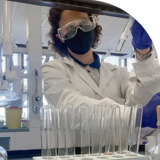The aim of the graduate programme is to prepare psychologists able to design and manage interventions to support individual well-being by promoting the ability ofindividuals to self-regulate, exercised on a cognitive (processes of understanding and interpreting information, planning, decisionmaking), emotional (management of emotions and stress) and communicative-relational level.
The perspective is the empowerment of the person's abilities and resources in the perspective of lifelong learning to develop a life design characterised by healthy and sustainable lifestyles. Although wellbeing refers to the individual, it is not conceived in isolation, but from the perspective that psychological processes have an 'embodied' (symbolic) nature and the subject acts within an ecological-cultural (in which interaction with environments, artefacts and symbolic systems is relevant) and social-community context.
The promotion of well-being is articulated within this reference model:
- prevention of situations and conditions that may threaten health and expose the individual to risks;
- development of personal skills;
- accompanying processes of change andpersonal transformation;
- advice/guidance at the turning points of life and career paths and decision support;
- support in critical moments, when the subject shows vulnerability and difficulties;
- rehabilitation and functional recovery following cognitive, emotional, communicative impairment.
The training provided by the graduate programme covers:
- understanding and critical analysis of psychological theories, models and concepts about subjective well-being and processes of developing personal potential, also considering the resources that the environment, technology, culture and community provide;
- the mastery of methodologies and tools for the assessment of levels of subjective well-being and for interventions aimed at maintaining and increasing well-being;
- knowledge of the main areas of care from a psychological perspective of subjective well-being.
Competence
The competences that the graduate programme aims to acquire are in the fields of research, assessment and intervention. They will enable the graduate to:
- set up and manage the demand analysis process;
- carry out assessment operations (skills profile, suitability, diagnosis, etc.) with different tools (observation, tests, interview, screening, etc.);
- set up and conduct training, empowerment and habilitation/rehabilitation trainings;
- plan, implement, set up, manage, evaluate and communicate initiatives for personal development and well-being;
- provide training, tutoring, coaching;
- analyse, evaluate and design artefacts and new technologies for empowerment, well-being and rehabilitation;
- carry out consultancy and expert witness work;
- set up and manage research and actionresearch processes.





